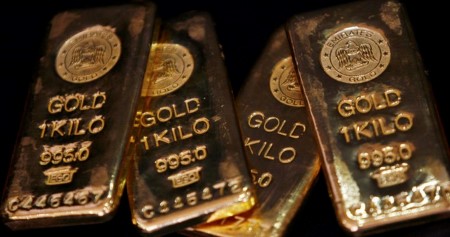




January Economic Update: Growth slows, prices rise
 DOWNLOAD
DOWNLOAD

Inflation Update: Up, up, and away?
 DOWNLOAD
DOWNLOAD

Quarterly Economic Growth Release: Growth takes on a slower pace
 DOWNLOAD
DOWNLOAD


Gold heads for worst quarter in five as dollar dominates

June 30 (Reuters) – Gold was mostly quiet on Thursday, but faced its worst quarter since early 2021 as a remarkable showing from the dollar kept investors away, with bullion’s outlook clouded by top central banks adopting aggressive tactics to fight stubborn inflation.
Spot gold was down 0.1% at USD 1,814.96 per ounce, as of 0754 GMT. US gold futures dipped 0.1% to USD 1,815.50.
Gold prices, set to drop for a third straight month, have fallen about 6.4% this quarter.
A combination of rising yields and US dollar have played their part in gold’s underperformance, City Index senior market analyst Matt Simpson said, but noted that gold priced in other currencies had not performed too badly.
The US dollar hovered near its recent two-decade peaks, and could record its best quarter in over five years, making greenback-priced gold more expensive for buyers holding other currencies.
Bringing down high inflation around the world will be painful and could even crash growth, but must be done quickly to prevent rapid price growth from becoming entrenched, the world’s top central bank chiefs said on Wednesday.
Higher bond yields and interest rate hikes by central banks to fight inflation raise the opportunity cost of holding bullion, which yields no interest.
Bullion’s performance in the second quarter erased gains made earlier in the year, as a spiraling Ukraine-Russia conflict lifted demand for the safe haven, with prices back around levels they started 2022 at just above USD 1,800.
Looking forward, the bias will become increasingly bearish as rate hikes continue to come through and bring down inflation expectations, Ilya Spivak, a currency strategist at DailyFX said, adding that USD 1,780-USD 1,790 is a critical support level.
Spot silver rose 0.4% to USD 20.78 per ounce, while platinum fell 0.3% to USD 913.93 and palladium XPD= eased 0.2% to USD 1,957.93. However, they were all still headed for monthly and quarterly losses.
(Reporting by Bharat Govind Gautam in Bengaluru; Editing by Rashmi Aich, Sherry Jacob-Phillips and Amy Caren Daniel)
This article originally appeared on reuters.com





 By Reuters
By Reuters